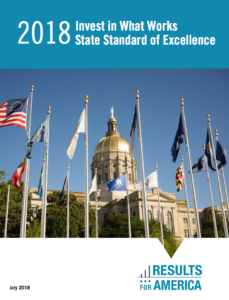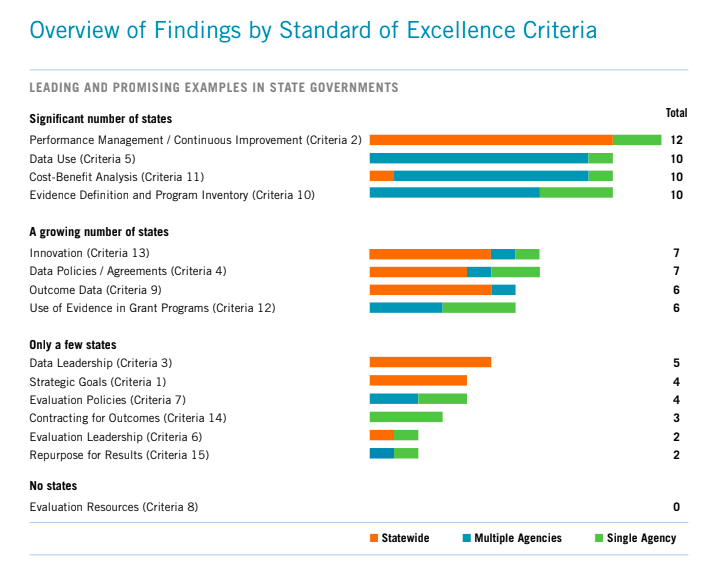Data-driven and evidence-based policies could become the standard for states looking to allocate resources wisely and create better outcomes for residents. A new study from Results for America highlights the states which use data to evaluate and shape public policy.

The report, released by the Washington D.C. non-profit organization on Tuesday with the National Governors Association, is called a “north star” for state governments to refine or reform current programs, such as workforce development, through data collection and analysis. Improving the efficacy of states to address and solve problems is the goal.
“We believe standards of excellence encourage the spread of best practices, inspire a friendly competition between policymakers and challenge leaders of both parties to develop new data-driven innovations,” Results for America Co-Founders Michelle Jolin and David Medina said in a statement.
The 2018 Invest in What Works State Standard of Excellence report identified five states which developed practices that exemplify these standards, including Colorado, Washington, Tennessee, Oregon and Minnesota.
They created publicly-searchable databases, implemented data sharing between departments and improved their research capabilities. Results for America said their solutions in creating a “statewide ecosystem” for better decision-making are a roadmap for other states to follow.
Colorado, under the leadership of Gov. John Hickenlooper, has consistently promoted its goals for evidence-based policy across its public services on a performance dashboard. The state has outlined four specific goals for workforce development and has updated its progress in meeting them. This has led Colorado to invest in its talent to address a critical workforce shortage across middle-skill occupations in high-growth industries in technology and healthcare.
That type of innovative thinking resulted in Colorado partnering with the Markle Foundation to promote Skillful, a resource for employers and job seekers to identify translatable skills for workers without college degrees. 19 other states embrace the program through the Skillful State Network, which enables them to share their results in strengthening local workforce pipelines and increase skills-based hiring practices.
“We use data to drive decision making and deliver results because that is what Coloradans expect and deserve,” Gov. Hickenlooper said in the Results for America press release.
Results for America used 15 criteria to identify the 88 programs, policies and practices across 30 states that are working to increase transparency and streamline government spending. Performance dashboards such as in Colorado and Tennessee meet the criteria for “Strategic Goals.” How states are acting on these goals through data collection and dissemination comprises the “Data Use” category.
Top examples of how states are sharing data across agencies and securing data are in workforce development and education. Kentucky and Indiana have worked to align their education systems to the needs of the state’s employers to develop their state’s workforce. Both have made this information a public resource for stakeholders to analyze research about the effectiveness of programs to improve educational outcomes.
These guidelines are not limited to workforce development. Results for America wants more states to adopt evidence-based policymaking for all publicly-funded initiatives. The organization highlighted Washington’s successful implementation of a healthcare database which saved the state $10 million. California is also using data-driven solutions to modernize its tax payment system and increasing state revenue.
RELATED STORY: Eagles descend on D.C. to preserve national service programs
One of the most notable aspects of the report is that the best examples of data-driven policy originate from states with different political leadership. Regardless of political affiliation, state lawmakers cited in the report are using the high-tech analytics tools at their disposal to make informed decisions.
“Facts should not be a political debate,” Oregon Gov. Kate Brown said about the study. “Rather, the use of evidence-based policy gives lawmakers the opportunity to put their differences aside and work towards common goals for our state.”
So far, only a handful of states meet a majority of criteria outlined in the report, indicating that there is more work to be done. The Results for America study shows that smart state governments are harnessing the massive amounts of data originating from their agencies and putting it to good use by making it available and easy-to-understand for all stakeholders.

The states which are doing it right are pioneers in the digital realm, much like businesses and individuals who have joined the information revolution and gained a competitive advantage. Their success shouldn’t be confined within state borders or partisan politics. That’s why Results for America promotes the shift to data-driven policy, so more people have access to programs and initiatives that work.
To read the entire Results for America report: click here.
WorkingNation and Results for America teamed up earlier this year in Washington D.C. for a screening of our Slope of the Curve animated short and the What Works Media Project short film Solutions for America’s Workforce Crisis. Click here for a recap of the event and to watch both videos.
Join the Conversation: Tell us your ideas about how states can improve efficiency in their spending and allocation of resources on our Facebook page.











